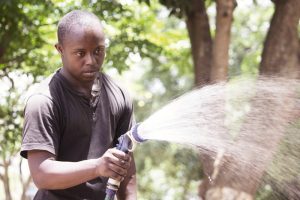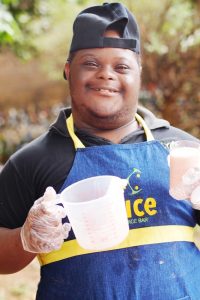By CHRISTINE MWAABA
IT has long been known that among persons with disabilities, those with intellectual disabilities continue to face challenges in relation to leading normal lives.
In fact, experts note that persons with intellectual and psychosocial disabilities are not provided with educational and vocational opportunities to meet their full potential.
This is what makes the work of the Sani Foundation in Lusaka unique as the organisation offers a place where the intellectually disabled can have a hope to attain their full potential.
This includes being able to find employment, which is central to the mission of the foundation.
What is outstanding is that the foundation would like to train more intellectually disabled persons as its capacity increases going forward and to be a beacon for the intellectually disabled in Zambia.
The foundation, which is headed by Michelle Chimuka currently, has intellectually challenged trainees who are training to get jobs or are already working through the help of the foundation.
The foundation has four training stations for the trainees that include an organic garden, a kitchen where others cook, a crafts station and a juice bar.
The purpose of the four stations is therefore to help trainers and job coaches identify what the trainees like or are good at by rotating them among the stations.
Using this information, the foundation develops profiles of each trainee which are used when finding jobs for them.
Once the trainees get to a certain level in their training, they are then transitioned to actual work. When the trainees find real work, job coaches will accompany them on their jobs to make sure they settle into the work and understand what their jobs entail.
The foundation is accessed by both the intellectually disabled and potential employers.
Makambe Namulwanda, is the foundation’s work base training coordinator in charge of the training at the Sani Foundation says a lot of people with intellectual disabilities.
Makambe explains that the foundation has programmes called DICE juice bar that stands for Disability Inclusive and Customised Employment and is a money-making kiosk for the Sani Foundation which is set up at different events.
Moreover, most importantly the juice bar is also a training centre which helps trainees interact and imagine actual social settings.
As a result, regardless of which station trainees begin their training from, they must eventually wind up in the juice bar.
The juice bar is therefore the trainees’ first employer because it is set up at different events where trainees are able to serve and interact with the public.
In the DICE juice bar, they are trained to make juices and smoothies. Some are fruit cutters while others are drink mixers and washers.
Trainees also learn from a cashier how to use money and the value of the money they will be making when employed.
She added that the foundation would like to train more intellectually disabled persons as its capacity increases.
Zambia Federation of employers Manager Economics and Policy Hilary Hazele says any educational training for people with intellectual disability can help them to achieve the goals.
Mr Hazele says it is inspiring to see people with intellectual disability integrated into a workplace.
“It is impressive to see how persons who have intellectual disabled are been employed and performing exceptionally if given support,” he said.
22 year Mubanga Nkonde is a dynamic youth who was diagnosed with Down syndrome and is now doing exceptionally well in the workforce after been trained by Sani Foundation in 2017.
His employed as a garden assistant at Gosner mission a job he describes as overwhelming as he is now able to financially contribute to the family in a little way.
According to the World Health Organisation, about two million people in Zambia are disabled, translating into about 15 percent of the population. Majority of these people live in poverty
The World Health Organisation (WHO) reports on mental health indicate that the majority of development and poverty alleviation programmes do not reach persons with mental or psychosocial disabilities.
In low and middle income countries, between 75 and 85 percent people do not have access to any form of mental health treatment because health systems have not yet adequately responded to the challenge.
Mental and psychosocial disabilities are associated with rates of unemployment as high as 90 percent.
Today, the employment of people with disabilities is seen not only as a civil rights issue but also as a practical way to increase productivity and access to a broader pool of skilled workers.









